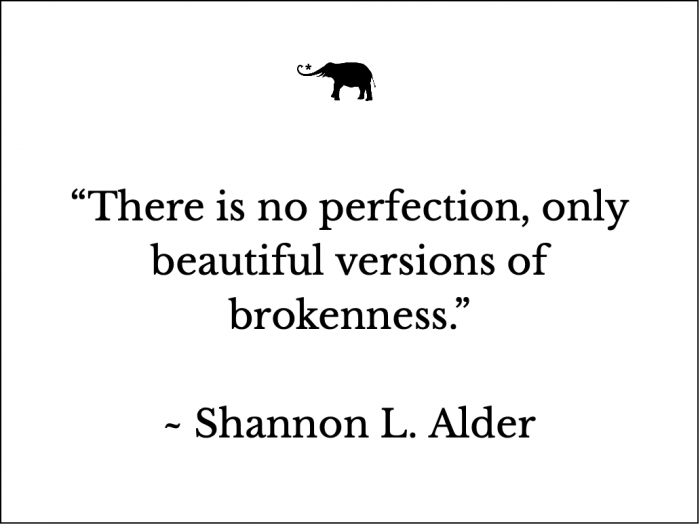View this post on Instagram
You may also like:
The Unnecessary Pressure of Perfectionism—& Why It’s Okay to Let Go.
11 Ways to Deal with those Pesky Anxious Thoughts.
The life of perfectionism is like living on a rat wheel.
Around and around we go, thinking we’re heading somewhere, when suddenly, we’re struck with immense fear, panic, and dread. We worry, oh how we worry. We worry about things that are minute, and things that are big—we worry about every detail of life as we desperately try to control outcomes, and ourselves, and well, life.
Letting go feels like we are failing—it often brings on more anxiety, this idea of surrender, when we’re accustomed to holding on for dear life, trying to juggle perfection in every area.
We keep trying, pushing and excelling. But eventually, the pressure gets to us, and when we can’t live up to the idea we are chasing after, we quit, procrastinate, become sick, or mentally burned out.
This results in yo-yo cycles, the “all or nothing” mentality, and quitting things too soon or self-sabotaging (including relationships). In addition, we may struggle with self-doubt and anxiety (like a tonne of anxiety).
We’ll do something exceptionally well, but then we worry it’s not good enough (or we’re not good enough).
On the one hand, we may be excited about what we are doing, but on the other, it’s like something is holding us back from thoroughly enjoying our life, work, relationships, and experiences.
It’s like having a rope around our stomach attached to a brick wall as we try to run forward. We’re putting in so much effort and time trying to move, and we get to a certain point, but the rope prevents us from moving. After a while, we feel exhausted, helpless, and stuck.
That rope is the mind of a perfectionist.
It’s unnecessary pressure.
We could remove the rope and freely run, but we remain trapped in this psychological loop until we make pivotal changes. And these changes are not about doing more, becoming more, or adding more to the plate—they are about understanding and undoing the conditioning that keeps us on this rat-wheel.
Here are some majors signs of perfectionism:
>> Disassociation
>> Driven by anxiety, fear, and worry
>> Lack of trust in one’s ability
>> Results focused instead of process focused
>> Procrastination
>> Lack of confidence in one’s self (body image, skills, as partners)
>> Seeks validation from others
>> Seeks out advice from others rather than trusting self
>> Cut off from intuition or ignoring instincts
>> Anxiety
>> Seasons of depression, despair, suicidal thoughts
>> Yo-yo cycles
>> Addictions
>> Quitting too soon
Perfectionism as a response to childhood trauma:
Perfectionism can be a trauma response due to childhood conditioning, psychological and emotional trauma, and abuse.
Perfectionism can also be reaffirmed through our society—trying to have the perfect body, feeling we need to have “stuff” to prove our success, social media, the education system, unhealthy relationship dynamics. It’s a cycle that continues within our families, religions, and communities.
As children, there may have been expectations imposed on us, standards that were so high and unattainable, yet we kept trying because we wanted to feel loved and accepted.
It feels like the more we try, the more the target moves.
After a while, we become so exhausted and depleted as this target moves, and we forever fall short.
This may be why we find ourselves spiraling into despair, helplessness, or depression after pushing for so long. It’s like our mind is saying, “You’re not perfect. So do more, be more, push harder, hurry up!”
The expectations imposed on children to be perfect, perform, and strictly abide by the rules of the adults cause doubt in one’s own ability.
As children we learn that they are correct, and we are wrong. Unfortunately, this carries over into adulthood, whereby we constantly second guess ourselves (hello anxiety).
If we were punished, ridiculed, or blamed for not living up to a specific standard, without room for mistakes, we learned that perfection is the only option. Therefore, if we fail to be perfect, we may feel it’s related to our worth. This can cause us to feel shame and embarrassment for not being perfect. We may wonder why we cannot reach this (impossible) goal. What is it about us that is incapable?
When children grow to feel they have to prove their worth because love doesn’t come naturally—and unconditionally—they think they must try harder and become perfect to be loved and accepted. But it’s impossible to be perfect, so the goal is unattainable.
We create this mask and false identity that we think people will like and approve of. At first, we might succeed. Most of us can agree that we have had great success and achievements by living up to this high standard of being. But the problem is retaining and maintaining it.
It becomes too hard to uphold and live by because it’s not authentic. In many cases, we probably reached a goal by doing it quickly, hard, fast, and obsessively (another trait of perfectionism).
It’s a heavy burden for anyone to strive for perfectionism because what is perfection? Who can say what it is and what it isn’t?
Often, we’ll find after a period of pushing ourselves to extreme limits, piling up our plate with so many ambitions, and trying to be someone “great” in the world, our mental and physical well-being takes a hit.
In my own life, when I have come tumbling down from exhaustion from pushing too hard for too long, thoughts of suicide come up. Helplessness is often associated with suicidal thinking—it’s a feeling of despair, like, “What’s the point if I’m trying so hard and not getting anywhere?”
Prayer has helped me through those times, and it has shown me how any of us, no matter how perfect we may try to be, can feel utterly lost for not living up to a specific image. Could it explain why suicide is so prevalent in our society?
The undoing of perfectionism.
Figuring out these cycles has taken a while. In my earlier years, I didn’t realize that my drive was a condition of perfectionism, anxiety, and unrealistic expectations.
My ego let me think that I was exceptionally driven to succeed in life and “special” for being this way. Growing up in a religious environment, stories about finding our destiny and being “chosen by God” were prevalent—so it went hand in hand with aspiring to be perfect.
Being highly driven is also welcomed in our society, even at the cost of our well-being and soul, so no wonder we often feel confused, as though there is something wrong with us if we question this way of being.
But, it is essential to question this approach and our perfectionist ways. We can be diligent, consistent beings who perform well in our lives without adding unnecessary pressure and risking our wellness. We can do things well and show up in our relationships without trying to be perfect.
It is possible through undoing our conditioning and acquiring balance.
It takes persistence, faith, and challenging outdated notions about success. It also takes looking within and doing the inner work to boost our confidence, feel better about what we do—and learning to trust that we are doing enough.
In my next article, I share six ways to overcome perfectionism and we’ll dive into how to move beyond those yo-yo cycles.
Please share with me in the comments your own story and experiences with perfectionism—when did you start to realize that you have perfectionist tendencies?
~
Part two: Perfectionism is a Trauma Response: 6 Ways to Heal Ourselves.












Read 31 comments and reply